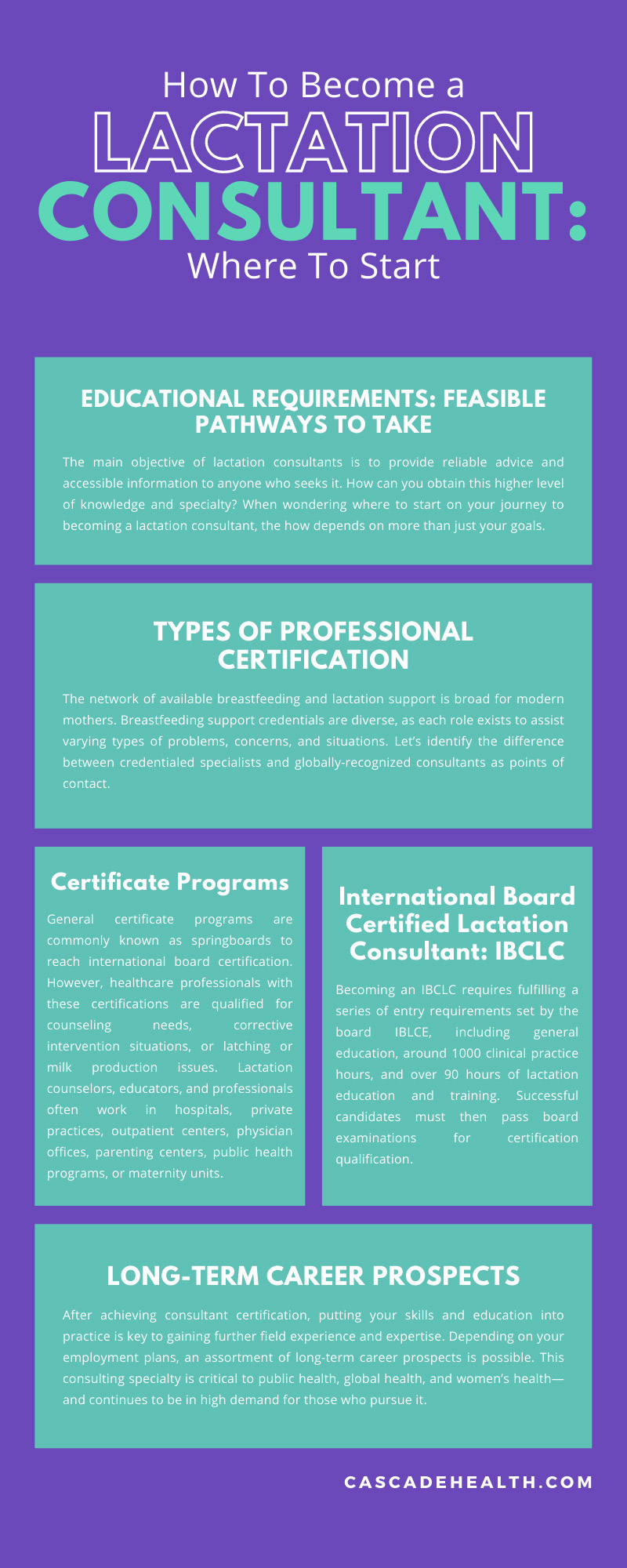How To Become a Lactation Consultant: Where To Start
Breastfeeding—known broadly as nursing—provides integral and ideal nutrition for the development of newborns and growing infants. Breast milk carries a wide array of positive benefits for mother and child. Yet the practice is no simple feat. As natural as the process is, breastfeeding is also something that both the mother and baby need to learn, one step at a time.
Everyone’s breastfeeding journey is unique. Not one looks exactly like another, as mothers of multiple children can attest to. Ergo, how is a successful transition attainable? Two words: lactation consultants. A lactation consultant is an empowering educational resource for new parents. Dedicated to every conceivable aspect of their specialization, lactation consultants are key healthcare professionals for the clinical management of breastfeeding.
Curious about this rewarding career? Certified lactation consultants must be trained to provide expertise on everything from prenatal education through weaning—and any guidance whatsoever in between. Here’s a closer look at how to become a lactation consultant: where to start.
Educational Requirements: Feasible Pathways To Take
The main objective of lactation consultants is to provide reliable advice and accessible information to anyone who seeks it. How can you obtain this higher level of knowledge and specialty? When wondering where to start on your journey to becoming a lactation consultant, the how depends on more than just your goals.
In general, your own educational background and experience dictate the right pathway for you. Within each pathway is a series of steps to complete—such as accredited academic studies, clinical hours, and professional mentorship—before you can move forward to the next stage.
Aspiring lactation consultants typically pursue training through the following pathways:
- Undergraduate certification programs or trade school certification
- Bachelor’s degree programs in health sciences or nursing with additional certification
- Master’s degree programs in health sciences or nursing with additional certification
Institutional Study and Training Program Duration
Numerous institutions can meet chosen pathway requirements, depending on your location and educational background. Keep in mind that in the US, licensing requirements to legally practice as a lactation consultant can vary from state to state. You should consider and strive to meet international standards for diverse employment prospects.
The duration of the certification process also depends on the scope of your completed education and previous healthcare training. General certification programs tend to take one to five years to complete. Those already employed as healthcare professionals—doctors, nurses, physician assistants, midwives, etc.—may be exempt from subject courses in health science, occupational safety, professional ethics, or medical terminology.
As follows, candidates without a background in healthcare will need to fulfill these foundational requirements in addition to specialization studies and clinical field hours before becoming eligible for a certification exam. Bridge courses can be a wise stepping-stone toward more in-depth training programs and professional certification. Overall, you can expect to undergo extensive training and rigid education while working toward career advancement in this specialty field.
Types of Professional Certification
The network of available breastfeeding and lactation support is broad for modern mothers. Breastfeeding support credentials are diverse, as each role exists to assist varying types of problems, concerns, and situations. Let’s identify the difference between credentialed specialists and globally-recognized consultants as points of contact.
Certificate Programs
General certificate programs are commonly known as springboards to reach international board certification. However, healthcare professionals with these certifications are qualified for counseling needs, corrective intervention situations, or latching or milk production issues.
Lactation counselors, educators, and professionals often work in hospitals, private practices, outpatient centers, physician offices, parenting centers, public health programs, or maternity units.
Certified Lactation Specialist: CLS
Offered as a practical course and examination for lactation education hours, this certification is a valuable means to obtain an IBCLC credential. Those with a designated CLS have good working knowledge and base skills of breastfeeding support to get them started on a clinical career journey.
Certified Lactation Counselor: CLC
Dedicated to promoting and supporting successful breastfeeding, CLCs are specialists in lactation counseling. CLCs must undergo at least 45 hours of training and pass a comprehensive examination to provide evidence-based breastfeeding management. CLCs work within a counseling model to meet the goals and values of mothers under their guidance.
International Board Certified Lactation Consultant: IBCLC
Becoming an IBCLC requires fulfilling a series of entry requirements set by the board IBLCE, including general education, around 1000 clinical practice hours, and over 90 hours of lactation education and training. Successful candidates must then pass board examinations for certification qualification.
The title of International Board Certified Lactation Consultant is the gold standard credential. IBCLCs have the widest range and depth of lactation education and knowledge to offer. Becoming internationally certified opens up a world of career opportunities to attract various clients or employers. IBCLCs have their names and certification numbers listed on a worldwide professional registry.
Long-Term Career Prospects
After achieving consultant certification, putting your skills and education into practice is key to gaining further field experience and expertise. Depending on your employment plans, an assortment of long-term career prospects is possible. This consulting specialty is critical to public health, global health, and women’s health—and continues to be in high demand for those who pursue it.
Those with leadership skills or those who prefer self-employment can build up a private practice to offer services to a local community. Building connections with healthcare professionals and community members is key to gaining notoriety and referrals within a practicing area. Healthcare providers such as doctors, RNs, or midwives who work in centers, clinics, or hospitals can also move into more managerial roles with professional certification and lactation-specific education.
Educational Resources and Supplies for Consultants
Certified lactation consultants understand the complexity of teaching the specificities of breastfeeding. Nursing educators and lactation specialists who provide lessons either one-on-one or in group settings benefit from having the right educational gear for the task at hand.
Cascade Health Care carries educational breast models for teaching breastfeeding. Our collection of breastfeeding models is of a high-caliber quality from reliable manufacturers. Designed for hands-on and visual teaching assistance, these models are ideal for practicing correct techniques and positioning. Reach out with any questions about our educational materials, resources, or products. We’re here to help create a happy and healthy future for healthcare providers, patients, and communities.

Recent Posts
-
What Midwives Should Teach New Parents Regarding Breastmilk
The transition into parenthood presents a profound physiological and emotional shift for growing fam
-
Best Practices for Cleaning and Maintaining Pulse Oximeters
Midwives and medical professionals understand the critical nature of accurate patient data. When mon



